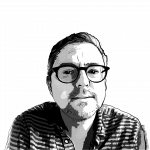When I walk around Bath, the city where I live, I’m struck by the feeling that my home town is not really English. The Romans built Bath. They put up a temple to Sulis Minerva here around 2,000 years ago and huge numbers of tourists come here to see the remains of the Roman baths every year. Inside, actors walk about in togas, making conversation with often bemused visitors.
The baths were only one part of a much larger Roman complex that now extends out far beneath the colossal Bath Abbey. The Saxons built the first church here, then the Normans demolished it and put up their own. It was around this time that Adelard of Bath, the great medieval scholar, translated Euclid’s Elements from Arabic into Latin, an intellectual achievement so important in the development of western thought that it has been almost entirely forgotten.
The medieval townsfolk were an unsentimental lot, it seems, and they pulled down the old Roman temple to use the stones for the city wall – I once read a 17th century travel guide to Britain that contained a description of the carved Roman blocks embedded in the ramparts.
Even less sentimental were the Georgians, who when their turn came demolished the city wall, smashed it to bits and used the rubble for the foundations of their terraces, crescents and circuses. The thought of the Roman archaeological treasures turned to dust by the Georgian hammers is enough to make your hair stand on end.
Even so, the Georgians made a very beautiful city and they did it in the neoclassical style. The architecture around here is mainly Palladian, meaning it’s based on the principles of the 16th-century Venetian Andrea Palladio. He was a fitting choice for a Roman city like ours, as Palladio’s ideas were originally inspired by the proportions and symmetries of Roman temples.
The tourists really start to arrive here in the spring, drawn by the hypnotic uniformity of it all – the buildings are all the same colour, the same style, the same stone. Lines of visitors thread their way through the streets, passing various sites that appeared in the TV show Bridgerton. Many of them come for that old-world, Jane Austen-style English charm of curtseying ladies and handsome gentlemen in tight breeches. Every year, the gardens by the river fill up with enthusiasts in period costume talking to each other in cod-Austen speak. It is all very harmless and all extremely cringey.
But, despite the outbreaks of English fetishism, the tourists who come here are visiting a city that – in its most fundamental character – is Roman-Italian. Perhaps that’s why Bath retains such a strong liberal identity; it stands as a clear example of the benefits of remaining open to the outside world. That, of course, is not to everyone’s taste. In his recent book attacking what he regards as Britain’s “new elite”, Matthew Goodwin picked out Bath as a hotbed of elitism. Perhaps he disapproves of Bath’s overwhelming vote to remain in the EU, or possibly its Lib Dem MP.
At the recent National Conservative conference, in London, Goodwin told the audience: “To say diversity is the basis of who we are is like saying we have no cultural identity of our own.” He may well think that – but the stones round here say different.




